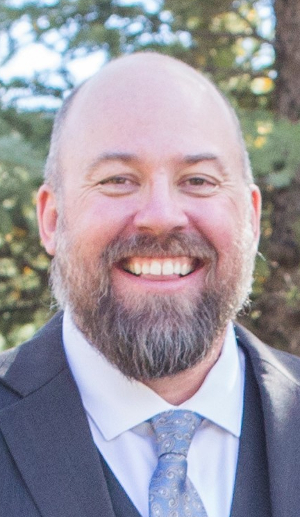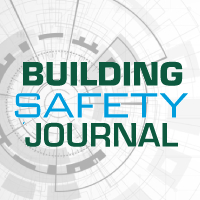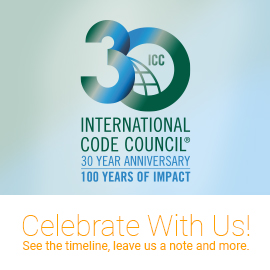
Master Code Professional Andrew Rogers
Andrew Rogers achieves the Master Code Professional designation, the gold standard of code certification

![]() It’s considered the Ph.D. of building safety codes certification. The Master Code Professional (MCP) is the highest level of designation the International Code Council offers and is the “gold standard” for demonstrating proficiency in the code profession. The Code Council has certified thousands of individuals, but only a small select number have attained this high level of achievement: just over 900 MCP professionals worldwide. Their achievements are a benefit to the code enforcement profession as well as their communities.
It’s considered the Ph.D. of building safety codes certification. The Master Code Professional (MCP) is the highest level of designation the International Code Council offers and is the “gold standard” for demonstrating proficiency in the code profession. The Code Council has certified thousands of individuals, but only a small select number have attained this high level of achievement: just over 900 MCP professionals worldwide. Their achievements are a benefit to the code enforcement profession as well as their communities.
To obtain this level of certification requires and demonstrates a commitment to the profession, diverse knowledge of codes and a high level of self-initiative. Andrew Rogers is the latest to join the elite group of Master Code Professionals. In this exclusive feature for the Building Safety Journal, we asked Andrew to share his experience on obtaining the MCP designation, highlights of his professional career and any insights or advice he has concerning the industry.
Andrew Rogers
Senior Building Inspector
Town of Vail
Vail, Colorado, United States
International Code Council member for five years
Colorado Chapter
BSJ: What led you to pursue and obtain MCP certification?
Rogers: Goal-setting has always been an effective motivation strategy for me. In work and in life, having a specific target helps maintain my focus over time. The MCP is the highest certification available, so it became my overall goal as I considered my annual training and development.
BSJ: How did you study and prepare for the many exams you took as a part of your MCP designation?
Rogers: Referring to the Code regularly as part of my inspection duties, having open conversations with my co-workers and other Code users, attending training seminars, and lots of reading helped me prepare for the tests.
BSJ: What does achieving the prestigious MCP status mean to you?
Rogers: For me, the MCP is like a university degree that indicates a person’s preparation for work. It isn’t the completion of my work as an inspector, but rather a beginning.
BSJ: How would you describe the value or benefits that have come with the recognition of your MCP status?
Rogers: The most valuable aspect is the sense of accomplishment after five years of work toward this goal. I hope that it will open doors in the future that would not be possible otherwise.
BSJ: What advice would you offer to those who are considering pursuing an MCP designation?
Rogers: Do it. The skills I refined while studying and the big-picture perspective that comes from taking in the whole code together have made me a much better inspector.
BSJ: How long have you been in the industry?
Rogers: Twenty years.
BSJ: What major changes have you seen?
Rogers: The biggest change is the global economy. When I was a carpenter’s apprentice many years ago, we only used local suppliers and, as contractors, we had a special relationship with them. Now anyone can go to a big box store or order equipment online, but the relationships are gone.
BSJ: What excites you about the future of your industry?
Rogers: Innovation is always exciting! When I was a builder I really only knew my own process. Now as an inspector I can see many more methods of construction and I continue learning better ways to do things. Inspectors have a unique opportunity to spread that knowledge around for everyone’s benefit.
BSJ: What is one piece of advice that you would give to those starting out in the industry?
Rogers: Don’t make things personal. The biggest trap for inspectors is to think they have something to prove or to be personally offended when a contractor makes a mistake. Our role is to inspect the work, and the work doesn’t have feelings or motives. When contractors learn you are not there to judge THEM, just the WORK, then it is much easier to maintain cooperative relationships.
BSJ: Building safety is the focal point of our mission here at the Code Council. What is the importance of building safety to you? How has ICC helped you in your career and commitment to public safety?
Rogers: Protecting the public is one of my primary motivations. As experts in building safety, the members of the building industry must strive to make the world safer. A safe environment allows the general public to accomplish more, which benefits all of society.
BSJ: Obtaining all those ICC certifications is quite an accomplishment. What are you going to do now that you have achieved this goal?
Rogers: I’ve spent 5 years as an inspector so far and taken all of the certification tests that apply to my current role. Looking ahead, I aim to refine my inspector skills while continuing to study the Code to deepen my understanding. Eventually, I hope to be more involved with the code development process.
BSJ: Thank you, Andrew, and congratulations. You have definitely been an encouragement to us all in your pursuit of excellence.
To earn the Code Council’s elite MCP designation, a candidate must first pass 10 core Code Council exams plus a number of elective Code Council exams. Typical Master Code Professionals hold 17 or more Code Council certifications. The Master Code Professional designation requires certified individuals to complete an additional 60 hours of Continuing Education Units every three years to maintain active status.
“The Master Code Professional certification is the pinnacle of all Code Council certifications, representing a level of effort, knowledge, and dedication that elevates not only the individual achieving it but the code official profession as a whole,” said Code Council Chief Executive Officer Dominic Sims, CBO.
Master Code Professionals are typically responsible for all technical and management aspects of code enforcement with duties that range from the management of a code enforcement department to the supervision of inspectors and plan reviewers.
“Congratulations to Andrew on achieving this important and significant accomplishment,” said Autumn Saylor, Director of the Code Council’s Assessment Center. “I challenge and encourage all code professionals to strive for this level of achievement, and look forward to congratulating more Master Code Professionals in the future.”
To learn more on how you can join this elite group and let us help you open the door to increased professional challenges and career advancement, click here.





